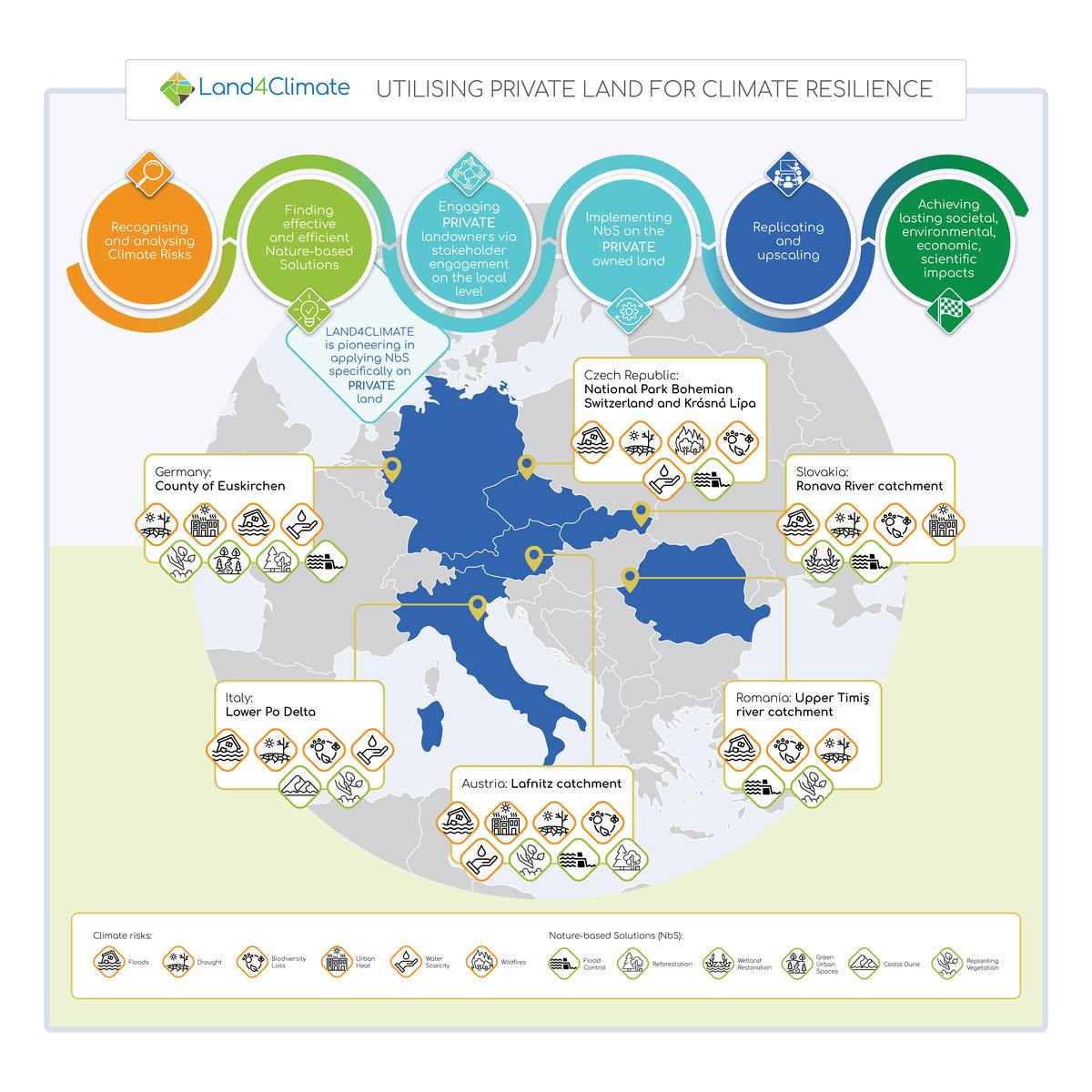What is LAND4CLIMATE?
LAND4CLIMATE aims to address challenges associated with climate resilience in regions affected by climate related issues, recognising the crucial role of Nature-Based Solutions (NBS) to promote systemic change.
The continental climate, marked by distinct seasons and significant temperature variations, exposes both rural and urban areas to various climate risks such as floods, droughts, wildfires, biodiversity loss, and soil degradation. In response, LAND4CLIMATE focuses on enhancing the resilience of these areas by promoting the implementation of multifunctional NBS on private land.
The slow adoption of NBS is due to various reasons. These include a lack of systemic analysis of cause-effect relations and benefits, a primary focus on public land rather than exploring the potential of private land, and a traditional approach of land acquisition for NBS implementation. To bridge this implementation gap, LAND4CLIMATE aims to provide land policy instruments and business models that encourage private landowners to actively support NBS implementation. By involving these stakeholders, the project makes the most of local knowledge and needs, ensuring a more effective, efficient, legitimate, and just systemic transition to climate resilience.
The mission of LAND4CLIMATE involves testing and demonstrating NBS for systemic climate resilience through innovative land policy strategies in the frontrunning regions. These regions, facing multiple risks, act as examples for implementation and upscaling. The aim is to later replicate these actions in other regions, both within and beyond similar bio-geographical regions. The project engages with six front-running regions and their relative replicating regions, covering both central and peripheral parts of continental bio-geographical areas. This approach facilitates the replication of measures, and inspiration of new synergies between NBS beneficiaries and landowners, ultimately supporting the mainstreaming of NBS across the European Union.
LAND4CLIMATE's outcomes include insights into the new business models, governance approaches, and financing mechanisms for the implementation of innovative NBS on private land. We aim to provide valuable knowledge on climate resilience, placing the land perspective at the core of NBS implementation. By doing so, LAND4CLIMATE actively contributes to adaptation to climate change impacts, offering a blueprint for the effective and efficient governance and implementation of NBS on private land.
LAND4CLIMATE takes action in six European countries: Austria, Czech Republic, Germany, Italy, Romania, and Slovakia.

Explore the LAND4CLIMATE Infographic.
To complement the project overview above, the infographic below provides a visual summary of the LAND4CLIMATE approach. It illustrates the project’s process from recognising climate risks to engaging private landowners, implementing Nature-Based Solutions (NBS), and scaling up for long-term impact.
The map highlights the six front-running regions across Europe where LAND4CLIMATE is piloting the use of NBS on private land. You can also see the key climate threats affecting each region, such as floods, drought, wildfires, and biodiversity loss, and the specific Nature-based Solutions being tested in response.
You can download the infographic here.

LAND4CLIMATE moves beyond state-of-the-art on four frontiers.
1. We generate new knowledge by looking at climate resilience in a way that combines water management, ecosystems, and how we use land.
2. We look at Nature-Based Solutions (NBS) as part of a bigger system, where they work best. Right now, most research and efforts focus on single NBS measures, often on a small scale and only on public land.
3. We are changing the way we use Nature-Based Solutions by focusing on land as a central aspect. Traditionally, when public authorities implement NBS, they usually first tackle technical or hydrological issues before looking at land management, civil engineering, and other practical aspects.
4. We are trying something new by concentrating on private land. In Europe, private land rights are strongly protected by the constitution. Working with private land can be tricky, as it involves complex, lengthy, and expensive interventions. Emphasising 'private' land highlights the challenges between public and private interests.
What are the expected impacts of LAND4CLIMATE?
LAND4CLIMATE is expected to have a substantial and far-reaching impacts as the positive outcomes of its applied measures are to be scaled up to the national level and disseminated across various countries and regions. This aligns with the goals of the EU Climate Change Adaptation Mission, specifically focusing on Continental Europe. In the LAND4CLIMATE regions, we are expected to see changes in society, the environment, and the economy due to the measures implemented during the project.
Societal impacts.
- Increased awareness and preparedness for climate risks and extreme events among local and regional organisations, private landowners, and vulnerable groups.
- Improved collaboration between relevant local, regional and national decision makers, private landowners and funding and implementing organisations.
- Implementation and demonstration of the NBS leads to improved regional and national policies and funding mechanisms.
- Improvement of living conditions - an improved disaster risk management will prevent loss of life due to extreme conditions, for example floods and urban heat.
Environmental impacts.
- Slow-down and retention of run-off water and recharged groundwater levels in rural and urban areas.
- Basis for restored river courses and ecosystems on the banks: river flooding that occurs mainly in restored natural floodplains.
- Improvement of the ecological quality of urban habitats through the expansion of green infrastructure, for example by planting trees.
Economic impacts.
- Leveraged private investments and efforts (i.e. labour) on the part of private landowners for reduction of climate risks.
- Reduced public costs for water-related infrastructure/measures as NBS are less costly.
- Avoided flood and drought damages on agricultural crops and forests.
- Avoided damages on physical infrastructure and buildings in urban areas.
Scientific impacts.
- Enhanced scientific discussion on NBS through demonstrated, practically validated, and replicated methodologies and procedures.
- Validation of transformative, long-term impactful and sustainable NBS for addressing climate risks in Continental Europe.

